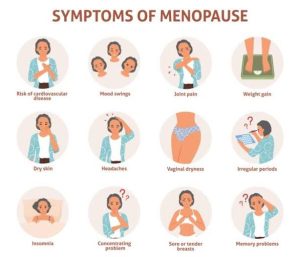Health
Menopause symptoms every woman should know

By Francesca Hangeior.
So, you’re already well aware that menopause typically goes hand-in-hand with a host of pesky symptoms, including mood changes, hot flashes and dry-down-there private parts (hey, just ask Drew Barrymore).
And maybe you’ve even heard that it can also cause trouble sleeping. But are you familiar with some of the lesser-known and unusual menopause symptoms, like burning mouth syndrome and tinnitus? Here’s everything you need to know.

Symptoms of Menopause
FIRST, WHAT ARE COMMON SYMPTOMS OF MENOPAUSE
In addition to the weird stuff (more on that later), there are common symptoms associated with menopause, too. It all starts with irregular periods, which will become less frequent over time and ultimately cease.
Once changes to menstruation start, it’s an indication that estrogen levels are dropping (permanently) and you’re liable to experience a number of other physical symptoms as a result—including hot flashes, night sweats, chills, vaginal dryness (and discomfort during sex because of it), weight gain due to slowing metabolism, difficulty sleeping and mood changes (irritability and random crying have been known to occur). Needless to say, none of this sounds very fun—but it is par for the course and, fortunately, these symptoms do most often become milder or even disappear in time.
10 UNUSUAL (AND LESSER-KNOWN) SYMPTOMS OF MENOPAUSE
And now, without further ado, here are the truly bizarre symptoms you likely haven’t heard of, but might want to brace yourself for.
BURNING MOUTH SYNDROME
Cat got your tongue? Nope, it’s probably Burning Mouth Syndrome—a not very well understood, but decidedly unpleasant menopause and postmenopause symptom that can cause “a painful, burning sensation in the tongue, lips, gums, or other parts of the mouth, which can be exacerbated by hot or spicy foods.” If you’re suffering from BMS, you won’t be able to see anything weird in your mouth—this syndrome is characterized by a sensation that occurs in the absence of lesions or other oral abnormalities—but you certainly will feel it.
If you’re experiencing this one, there are a number of things you can do to get some relief: Sucking on ice chips and avoiding acidic foods is a good place to start, but Mayo Clinic medical experts say that stubborn cases often respond to treatment with cognitive behavioral therapy, alpha-lipoic acid supplements, antidepressants or, ironically, capsaicin (among other things).
ELECTRIC SHOCK SENSATIONS
Some women experience sudden, sharp sensations that feel like electric shocks or jolts in various parts of the body, including the head, neck and limbs.” Pretty spooky, right? There’s very little research into Electric Shock Sensation (ESS) but women who experience it describe it as a “snap, crackle, pop” under the skin that often immediately precedes the infamous menopause symptom known as a hot flash. ESS is most likely triggered by hormonal fluctuations (duh) and, though quite bizarre, this harmless short-lived zap isn’t thought to be a condition that requires treatment, nor is it a cause for concern.
ITCHY SKIN
Decreased estrogen levels cause dry, itchy skin—and sometimes even the onset of eczema, rashes and hives—in many menopausal women. For more severe presentations, your physician might prescribe topical corticosteroids, but many women can find relief by taking warm, rather than piping hot, showers and generously applying over the counter moisturizers designed to protect the delicate barrier of aging skin.
BODY ODOR CHANGES
Menopause can cause changes in body odor—ranging from noticeably more potent to just plain different—due to changes in hormonal and metabolic activity, explains Dr. Afzal. Alas, there’s not much you can do about it besides embrace your new signature scent or stock up on strong deodorant.
INCREASED ANXIETY AND/OR DEPRESSION
If you’re feeling extra blue these days, you can blame menopause for that, too. According to research published in Obstetrics and Gynecology Clinics of North America, “vulnerability to depression is increased across the menopause transition and in the early years after the final menstrual period.” Indeed, Dr. Afzal confirms that “hormonal fluctuations during menopause can contribute to feelings of anxiety and depression, which can be debilitating for some women.” Anxiety and depression don’t have to be the new normal, though—antidepressants and other psych meds can be as effective for menopausal women as they are for the rest of the population, and behavioral interventions, including different modes of therapy, can go a long way to improving mental health symptoms, with or without medication.
HEART PALPITATIONS
Don’t be alarmed if your heart skips a beat, either: The expert tells us that hormonal fluctuations (i.e., the force behind all menopausal woes) can cause irregular heartbeats or palpitations, which are felt as an unusually rapid heart rate, in some women. According to the British Heart Foundation, these palpitations and irregularities are typically harmless and most often occur during hot flashes. Alas, reduced estrogen levels during menopause are also associated with an increased risk of heart disease, since said hormone plays an important role in protecting the arteries of a woman’s heart. As such, women who are experiencing this menopause-related symptom needn’t panic—after all, that won’t help your heart rate—but it’s wise to check in with your doctor and keep a closer eye on your heart health going forward, nevertheless.
JOINT PAIN
Hormone fluctuations, inflammation and other factors can contribute to joint pain in menopausal women. This unpleasant condition is called arthralgia, and although the causes are hard to pin down, a 2010 review published in Maturitas confirms that menopausal women are at considerably higher risk, and that decreased estrogen is likely to blame for exacerbating the symptoms of joint stiffness and pain. Fortunately, the same study suggests that Hormone Replacement Therapy (HRT) is proven to be effective at relieving arthralgia in the menopausal population, so it’s a treatment worth considering if you’re experiencing vasomotor symptoms that are particularly disruptive or distressing.
HAIR LOSS
In case you missed it, menopause can cause hair loss. Indeed, the combination of plummeting estrogen and progesterone levels that occurs during menopause “can cause hair to become thinner, drier, and more brittle, leading to hair loss or breakage. So, how to restore your lackluster locks to their former glory, you ask? For starters, there are a host of shampoos that boast hair-strengthening and volume boosting benefits. There are also OTC medicated treatments that encourage hair growth and even a medical procedure involving platelet rich plasma (PRP) injections that you can seek if the former options don’t deliver the desired results.
TINNITUS
Menopause can cause ringing or buzzing in the ears, which is known as tinnitus,” and yes, it can be a very annoying distraction to the unlucky women who experience this symptom. On the bright side, a 2018 nationwide study published in Oncotarget acknowledged the increased risk of tinnitus among menopausal women and identified Hormone Replacement Therapy (once again) as a treatment that may provide potential benefits in the management and prevention of the condition—so if this menopause-related hearing change has been plaguing you, it might be worth exploring the option with your doctor.
INCREASED URINARY TRACT INFECTIONS
Changes in the urinary tract during menopause can make women more susceptible to UTIs, the expert tells us, which can cause painful urination, frequent urination and other unpleasant symptoms. If you’re experiencing discomfort when urinating or a constant urge to go (and little relief for your effort), you should definitely inform your doctor, as antibiotics are the treatment of choice for UTIs.
Health
Men who desire healthy children should marry before 40, expert advises

By Francesca Hangeior
Men who wish to father healthy children have been advised to get married and start a family before the age of 40.
The President of the Nigerian Association of Urological Surgeons, Professor Nuhu Dakum, revealed that ageing negatively affects sperm quality, thereby increasing the chances of passing on genetic disorders to offspring.
“Sperm quality reduces with age. The count, motility, and morphology are all adversely affected. Also, there is an increase in damage to the sperm DNA, thus predisposing babies to genetic diseases,” he explained.
The consultant urologist further stated that while the age at which sperm quality varies, “generally it’s more significant from about 40 years of age.”
He attributed factors including “biological changes with age, lifestyle, e.g., smoking and alcohol, unhealthy nutrition, occupational exposure to toxins, etc.”
Dakum’s statement follows a recent viral conversation on X, formerly Twitter, that older men have weak sperm.
The tweet by Queen read, “Older men are more likely to give you children with genetic mutations like dwarfism, autism, Down syndrome, and schizophrenia.
“Their weak sperm has a higher risk of causing mutations in kids. Try your best not to have kids with their sperm.”
According to the Texas Fertility Centre, sperm quality and quantity decline over time, leading to age-related male infertility.
However, Healthline, a health portal, pointed out that sperm quality declines significantly in men over the age of 50, with factors such as sperm count and lifestyle habits being responsible for the deterioration.
Speaking further, Dakum stated that older men who desired to have healthy children could do so if they maintained good sperm health, noting that living healthily improves life generally and thus sperm health.
He added, “There may not be much to prevent it if the man is already old, but living healthy improves general and thus sperm health. However, genetic selection in the embryo or sperm checks for sperm damage can be done to reduce the chances, but these are expensive and not widely available. Donor sperm for such couples is also an alternative.”
Health
Stop patronising untrained birth attendants, LASG warns pregnant women

By Francesca Hangeior
The Special Adviser to the Lagos State Governor on Health, Dr. Kemi Ogunyemi, has cautioned residents against patronising untrained birth attendants.
Ogunyemi gave the warning during a medical outreach organised by the Simisola Alabi Foundation, an initiative focused on enhancing maternal and child health across Lagos State.
Speaking during the medical outreach held on Saturday in the Obalende area of Lagos, the Special Adviser to the Governor on Health, Kemi Ogunyemi, said, “Maternal deaths happen too often because women avoid hospitals.
“Health insurance removes the financial barrier to quality care.”
She reaffirmed the state government’s commitment to making healthcare both affordable and accessible through the expansion of its health insurance programmes.
Beyond maternal care, Ogunyemi noted that the outreach served as a vital opportunity to address other pressing public health concerns.
“Many in this community didn’t know about the diphtheria outbreak. Education saves lives, and this event provided a perfect setting to share crucial health information,” Ogunyemi added.
Ogunyemi also called on men to play an active role in promoting family health, emphasising that healthcare decisions are a shared responsibility.
“Whether it’s health insurance or family planning, it’s a shared responsibility. Men must not be bystanders,” she said.
Earlier, the founder of the Simisola Alabi Foundation, Simisola Alabi, shared the inspiration behind the outreach, stressing the transformative impact of community support.
“It’s not because I have so much money; it’s because I understand the power of giving. Helping one mother today could uplift an entire generation tomorrow,” Alabi explained.
She pointed out that the programme placed particular focus on tackling stunting, a major but often overlooked issue affecting children’s physical and cognitive development.
“Stunting affects not just height but brain development and life outcomes. By empowering mothers today, we’re shaping a better future for our children,” she noted.
Alabi also urged corporate organisations and individuals to direct their social responsibility efforts to underserved communities.
“The real heartbeat of Lagos is in communities like Obalende, not just the affluent neighbourhoods. Channel your CSR here where it truly matters,” she said.
Health
Uncontrolled diabetes in pregnancy may lead to cataracts in children – Ophthalmologists

By Francesca Hangeior
Contrary to the belief that cataracts mainly occur in older adults, eye specialists say babies and children could be born with it or develop the eye disease due to certain health conditions.
The ophthalmologists said pregnant women with uncontrolled diabetes and other metabolic diseases might give birth to babies with cataracts, though there were other causes of congenital cataracts in children.
The experts said it was important for pregnant women to have good antenatal care to reduce the risk of pregnancy complications that could affect the eyes of their babies when they are born.
Besides diabetes in pregnancy, the ophthalmologists also disclosed that certain infections in pregnancy like rubella (German measles) can lead to a woman giving birth to a child with cataracts while advising teenage girls to go for rubella vaccination.
They noted that cataracts in children could either be by birth (congenital) or acquired after birth, warning that an injury to the eye could cause cataracts in children.
However, the physicians who spoke during an exclusive interview with PUNCH Healthwise, said not all cataracts in babies and children had a known cause.
The World Health Organisation says cataract is a clouding of the lens in the eye that normally affects vision, stressing that cataract is the most common cause of blindness and visual impairment often related to aging.
The global body, however, said, “Occasionally children are born with the condition, or a cataract may develop following an eye injury, or as a result of inflammation or other diseases, such glaucoma and diabetes. Sometimes, the development of cataracts is linked to steroid use or it may develop after exposure to some types of radiation.”
Speaking with our correspondent, a paediatric ophthalmologist, Dr. Halima Alimi, also disclosed that some cataracts in children could also be hereditary, assuring that children with significant cataracts could be effectively treated by surgery.
The eye expert, who is the Executive Director of Restore Foundation for Child Sight, a non-government organisation that advocates for improved eye care for children, said parents should ensure that their babies go for routine eye checks after six months of birth to detect the condition early before it negatively impacts on the overall growth and development of the child.
Giving insight into why children also suffer from cataracts like older people, Alimi explained, “Why children suffer cataracts is because of the variety of things that potentially upset the clarity of the lens of a child’s eye and so we have said that it can be congenital or acquired.
“Part of the congenital causes of cataracts are children whose mothers suffer certain infections while they are pregnant with them which we call intrauterine infections. Most of them are viruses and so there are a host of diseases that pregnant mothers can have. Top on the list is something called rubella. It is a German measles.
“It is a sort of measles but a little bit different from the popular measles that is known. It is caused by the rubella virus. So when a pregnant woman is affected by German measles, the virus will go ahead to cross the placenta and infect the baby depending on the stage of the pregnancy at which it infects the baby.
“If it is in the early stage of the pregnancy when the eyes are still developing, it can cause congenital cataracts as well as other problems that the child may be born with.
“This is one of the most common causes of infective cataracts in children born with it. And then also children whose mothers have certain metabolic diseases such as uncontrolled diabetes, the children themselves if they are born diabetic and other metabolic diseases, can cause cataracts as well. “
According to an international non-governmental organisation that works with partners in developing countries to treat and prevent avoidable blindness, Sightsavers, cataracts are one of the leading causes of visual impairment and blindness in children.
Alimi also pointed out that there are a variety of other causes of cataracts in children that are not congenital but are acquired.
“Things like injury. We all know that children can suffer eye injury from moderate to severe. So if an injury is severe enough it can result in cataracts just by having an injury. Injury is the cause of cataracts occurring in one eye in children. Inflammation inside the eye can lead to cataracts in children if not handled effectively. That is why we discourage self-medication”, she said.
The ophthalmologist also said genetically inherited diseases and indiscriminate use of steroids can cause cataracts in children.
On signs of cataracts in children, Alimi identified delayed milestones such as sitting, social smile, walking, and standing as some of the early indications, urging patients to establish the habits of routine and annual eye checks for their children..
According to her, squinting during bright light, a white dot within the eye, abnormal movement of the eye, not focusing when looking, and squinting the eyelids when there is sunlight are also some of the signs of cataracts i.n children
Commenting on the treatment, the eye specialist said cataracts when they are significant are treated surgically, adding also that vision rehabilitation for the children after the surgery will enable them know how to use their spectacles and how to maintain good eyesight.
She said cataracts in children could be prevented through immunisation in pregnancy, optimal antenatal care, prevention of injury, avoidance of drug abuse, vaccination of teenage girls against rubella.
A Consultant Ophthalmic Surgeon, Dr. Folasade Fasina, told PUNCH Healthwise that cataract is the most common cause of blindness in Nigeria.
The ophthalmologist disclosed that cataract is treated by the removal of the cloudy lens, adding that this is replaced with a clear artificial lens.
She stressed that the removal can only be done through surgery.
Fasina explained, “There are various methods of removal but all are surgical.
“Diagnosis is made when a doctor, an eye specialist, examines and carries out some tests on a patient complaining of blurred vision.
“Cataract is treated by an ophthalmologist who performs surgery on the eye. When the cataract is still small, vision can be improved with prescribed glasses, but the definitive treatment is surgery.”
In a 2021 study published in ScienceDaily, researchers from Denmark found that mothers who have diabetes before or during their pregnancy are more likely to have children who go on to develop eye problems.
The researchers analysed the associations between maternal diabetes before or during pregnancy and the risk of high refractive error, conditions in which there is a failure of the eye to properly focus images on the retina.
They advise that early screening for eye disorders in the children of mothers with diabetes may play an important role in maintaining good eyesight health.
-

 Opinion13 hours ago
Opinion13 hours agoRIVERS, WIKE, FUBARA, AND THE WAY FORWARD
-

 Politics12 hours ago
Politics12 hours agoJust in: Delta PDP Reps members defect to APC
-

 News23 hours ago
News23 hours agoFULL STEPS: How to check 2025 JAMB results
-

 News23 hours ago
News23 hours agoMinistry denies awarding N13bn contracts without due process
-

 News17 hours ago
News17 hours agoVDM may be released on Tuesday
-

 News14 hours ago
News14 hours agoNANS Barricades Lagos-Ibadan Expressway Over Alleged NELFUND Mismanagement
-

 News14 hours ago
News14 hours agoCourt bans Nnamdi Kanu’s in-law from 3 proceedings over live streaming
-

 News10 hours ago
News10 hours agoTension As Lawmakers Warns of Public Revolt Over Insecurity

















